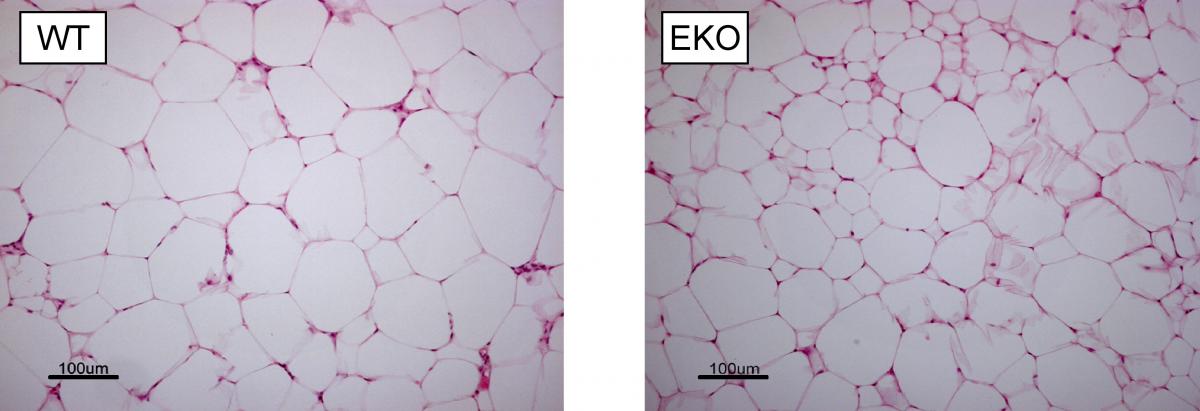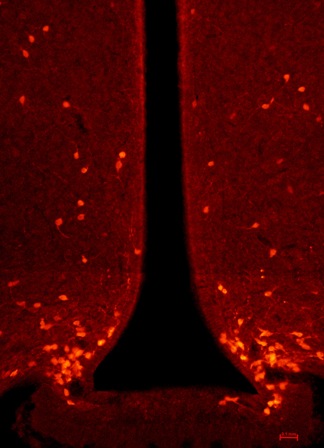Weizmann Institute scientists have added another piece to the obesity puzzle, showing how and why a certain protein that is active in a small part of the brain contributes to weight gain. This
research appeared today in Cell Metabolism.
Prof. Ari Elson and his team in the Institute’s Molecular Genetics Department made the discovery when working with female mice that were genetically engineered to lack this protein, called protein tyrosine phosphatase epsilon (PTPe, for short). The scientists had originally intended to investigate osteoporosis, and thus, they also removed the ovaries of these mice. Taking out ovaries typically causes mice to gain weight to the point of obesity – so the scientists were surprised to find that the weight of the genetically-engineered mice remained stable. Working with
Dr. Alon Chen and his group in the Neurobiology Department and Prof. Hilla Knobler, Head of the Unit of Metabolic Disease and Diabetes of Kaplan Medical Center, the researchers fed these mice a high-fat diet, yet the PTPe-deficient mice maintained their svelte figures; they burned more energy and had more stable glucose levels as well.
To find out how the lack of this protein could keep mice slim and healthy, the scientists looked at the hypothalamus, a region of the brain that takes in assorted stimuli, including a wide variety of hormones, and sends out messages of its own in the form of new hormones and nerve signals. The hypothalamus plays a vital role in regulating body mass – a complex balancing act that involves, among other things, controlling appetite and physical activity.
Elson and his team found that PTPe blocks the messages from a hormone called leptin – a key player in body mass regulation. They revealed exactly how it does this: PTPe responds to the leptin signal in the hypothalamus, inhibiting certain molecules, which in turn dampens that signal.
Among its actions, leptin reduces appetite and increases physical activity. Paradoxically, obese people often have a surfeit of leptin circulating in their blood. This is because, while their bodies produce the hormone normally, their cells become resistant to its effects, and more leptin is then generated to compensate.
The new research shows that PTPe plays a role in this resistance. The scientists found that the mice lacking the protein were highly sensitive to leptin; and they remained so despite aging, ovary removal or high-fat diets. This suggests that in obese humans with leptin insensitivity, inhibiting PTPe might, conceivably, help to reestablish the leptin response and help induce weight loss. This, however, requires further research to ensure that it acts in the same way in humans with no dangerous side-effects.
Elson: “Interestingly enough, the effect seems to be gender-specific. Male mice hardly benefitted at all from the lack of PTPe compared with the female mice. This finding could open up whole new lines of inquiry in obesity studies.”
Prof. Ari Elson’s research is supported by the M.D. Moross Institute for Cancer Research; the Kekst Family Institute for Medical Genetics; the Yeda-Sela Center for Basic Research; the Fritz Thyssen Stiftung; the Maurice and Vivienne Wohl Charitable Foundation; and the estate of Fannie Sherr. Prof. Elson heads the Ekard Research School of Biological Science; and the Lorry I. Lokey Research School of Biochemical Science. He is the incumbent of the Marshall and Renette Ezralow Professorial Chair.
Dr. Alon Chen’s research is supported by the Nella and Leon Benoziyo Center for Neurosciences; the Nella and Leon Benoziyo Center for Neurological Diseases; the Carl and Micaela Einhorn-Dominic Brain Research Institute; the Irwin Green Alzheimer's Research Fund; the Mark Besen and the Pratt Foundation, Australia; Roberto and Renata Ruhman, Brazil; and Martine Turcotte, Canada. Dr. Chen is the incumbent of the Philip Harris and Gerald Ronson Career Development Chair.

